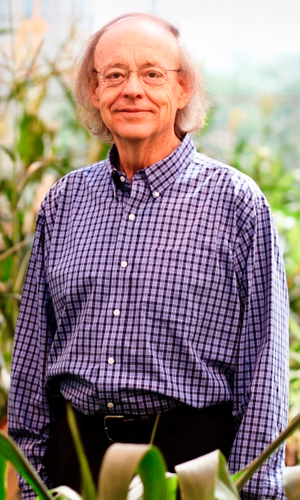Dr. James Birchler
Dr. James Birchler

PhD, 1977 Indiana University
Chromosome evolution and function in plants and fruit fly
Our laboratory studies gene expression in multicellular eukaryotes on both the specific gene and chromosomal levels using Drosophila and maize as experimental organisms. We are interested in the mechanisms involved, how the two levels are interconnected and how they evolve.
A longstanding topic of investigation involves understanding the balance of gene regulatory mechanisms. Our results indicate that changing the stoichiometry of individual components of regulatory complexes affects target gene expression, which is manifested in chromosomal dosage series. The most common such dosage effect is an inverse correlation between the dosage of a chromosomal segment or individual regulator and the amount of target gene expression. This “inverse dosage” effect is likely to contribute to the molecular basis of aneuploid syndromes and when a regulatory dosage change is combined on the same chromosomal segment as a target gene, the target will exhibit dosage compensation. This type of dosage effect appears to be responsible for X chromosomal dosage compensation in Drosophila and potentially other species.
A second topic of study involves the role of the so-called “RNAi machinery” in transcriptional gene silencing. Small RNAs appear to act as sequence specific guides for histone modifying enzymes to regions of the genome that contain repetitive sequences such as heterochromatin, transposable elements, telomeres and other features. The modifying enzymes set up a less permissive environment for transcription. Heterchromatin formation involves the methylation of histone 3 on lysine 9 whereas cosuppression of repetitive transgenes is mediated by methylation of histone 3 on lysine 27.
Our laboratory has developed a method for chromosome painting in maize. This procedure has allowed us to examine numerous issues about the maize genome. The diversity and homogenization mechanisms of repetitive DNA elements can now be investigated. It is now possible to visualize on the maize somatic chromosomes individual gene copies, single transgenes and single copies of transposable elements such as Activator, Suppressor-mutator and RescueMu.
The structure and function of maize centromeres are under study. We have focused on the centromere of the supernumerary B chromosome because it contains a specific repeat unit that the other centromeres in the genome do not contain and thus can be examined individually. This centromere has been subjected to a deletion analysis to determine the minimum requirements for centromere function. Competition studies in heterozygotes between two different B chromosome centromeres are underway to gain an understanding of the nature of their rapid evolution. Competition between different sizes of B centromeres is also being studied in dicentric situations to examine centromere strength. Recent work has resulted in the recovery of numerous cases of inactivated centromeres. Several examples of de novo centromeres formed over unique sequences in the absence of canonical DNA repeats have been documented. These findings illustrate the epigenetic nature of centromere activity in plants. These materials are being used to gain an understanding of how centromeres are specified.
Our laboratory has produced artificial chromosome platforms for maize. Such constructs should be useful for using maize as a factory for the inexpensive production of foreign proteins and as a means to introduce novel biochemical pathways to maize to confer new properties to the plant. This technology has the potential to engineer multiple new traits into crops for improved agricultural practices. From a basic standpoint, artificial constructs will allow investigators to produce designer synthetic chromosomes that will help them understand the minimum features required for function.
Please visit our projects website for further details.
Barbara McClintock Prize for Plant Genetics and Genome Studies 2020
Albert Nelson Marquis Lifetime Achievement Award 2019
SEC Professor of the Year Award 2017
SEC Faculty Achievement Award 2017
Fellow of the ASPB Award 2017
Fellows Award, Academy of Science of St. Louis 2016
Dr. Abraham Eisenstark Faculty Fellowship Award in Biological Sciences 2016
Faculty-Alumni Award, Mizzou Alumni Association 2015
President’s Award for Sustained Career Excellence, UM System 2015
Abraham Eisenstark Faculty Fellow Award 2015
Einstein Professor, Chinese Academy of Sciences 2014
Fellow, National Academy of Inventors 2014
Member, National Academy of Sciences 2011
Curators’ Professor, University of Missouri 2009
Award for Excellence in Academic Achievements, Northeast Normal University, Changchun, P.R. China 2007
Named one of five “Teaching Legends”, Mizzou Magazine 2003
Zeta Tau Alpha Faculty Appreciation 2003
Fellow, American Association for the Advancement of Science 2002
Outstanding Teaching Award, MU Panhellenic Council 1997